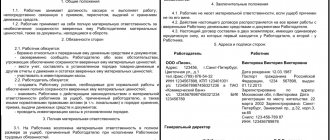Unilateral termination of an employment contract
There is no suitable article for dismissal without cause, but legal reasons can be found in Article 81 of the Labor Code of the Russian Federation. Application of this article in its own way may lead to violation of laws. What actions can be considered illegitimate:
- dismissal under the guise of staff reduction. Instead of actually removing an unclaimed position, a position with the same job responsibilities but under a different name takes its place. In this way they are trying to fire untouchable categories of workers.
— receiving repeated disciplinary sanctions. Subsequent dismissal will be legal if the grounds were substantial and legal. Let us also add that two types of punishment cannot be used simultaneously for one offense.
- failure to comply with the position held or failure to pass certification. In this case, dismissal is legal only if a certain procedure is followed. All employees of the department must pass the knowledge test, not an individual.
In addition to the legality of justifying the reasons for dismissal, the employer must comply with the procedure for terminating the employment relationship. Otherwise, it is possible to resolve labor disputes in court.
The legislative framework
Forcing an employer to write an application is unlawful according to Resolution No. 2 of the Plenum of the Supreme Council, issued in March 2004.
Termination of an employment contract for alleged absenteeism without proper documentation, including drawing up an act and an explanatory note, is illegal according to Article 81 of the Labor Code. There are often cases when an employee was fired (an appropriate order was issued) during a period of four-hour absence due to being late for work.
The imposition of a disciplinary sanction is allowed only within one month from the moment of discovery of the violation that provoked the termination of the contract. Registration of dismissal at a later date is absolutely illegal (Article 193 of the Labor Code).
Absence from work is considered a violation of labor discipline if this period took more than four hours (and not exactly four hours or less!).
Management is obliged to require written explanations from the employee, which the offending employee must provide within two working days. Only after this period is it possible to draw up an act recording the refusal and issue an order (Article 193 of the Labor Code).
If the guilt of the management of an organization or enterprise is proven, the court orders that the dismissed employee be returned to his previous job and paid compensation for moral damage caused (the amount is determined individually), as well as missed working days (the average salary for each missed day). Such punishment is imposed in accordance with Article 234 of the Labor Code.
Unlawful dismissal at will
How a handwritten statement violates labor laws
The manager has a huge number of ways to pressure and provoke dismissal upon application. Starting from moral oppression and ending with threats to leave an unpleasant article in the work book.
In such a situation, the employee should not give in, but rather collect evidence of unfair treatment. Copies of official correspondence, tape recordings, and the like are suitable for the court.
Even if an employee wrote a statement and then changed his mind, the employer does not have the right to keep the statement. And even more so to use it later. The dismissed person will need to withdraw his premature application in writing. Even if the employer has already called a new candidate. The exception would be a written agreement with the recruit.
Consequences for the employee
So, the labor inspectorate or another government agency determined that the dismissal was illegal. Now it remains to determine the consequences of illegal dismissal. There is an interesting feature here - the list of legal consequences of illegal dismissal is determined by the victim himself. However, he does this not completely and not entirely independently, but in accordance with the law. However, first things first.
So, as soon as the labor inspectorate has determined that the employee was fired illegally, he is returned to his old place of work. At the same time, he is not only fully reinstated in his position, but also his lost work time is returned to him. That is, the labor inspectorate establishes that for all the time that the employee did not work, he should be accrued salaries, bonuses and other funds that he could have earned. In addition, these spent days will also be included in his length of service and will be fully taken into account when calculating vacations.
The next change will be a change in the reasons for dismissal in the work book. The old entry will be removed, and a note will also be made that the employee was either fired by mistake, or he quit of his own free will. The last entry is made if the employee no longer wishes to work at his place of work.
The last measure is the assignment of compensation. If the employee is not reinstated (at his request), then he may demand compensation commensurate with his losses caused by the dismissal. If the employee is fully reinstated in his position, then it will be possible to assign any payments only through the court. But the employee has the right to demand moral compensation in any case, since it is not included in the general list of payments for illegal dismissal.
Algorithm for protecting the interests of an employee in court.
1. Grounds
The main mistake that illegally fired people make is wasting time. You have 30 days from the date of dismissal to file a claim. Missing this period will make it impossible to win a lawsuit against the employer.
The only exception is if there is a good reason. These include:
- documented illness of the applicant or caring for a sick relative.
- business trip from a new employer
— emergencies
Waiting for action on the part of the labor inspector is not included in the list of extenuating circumstances.
The trial of the labor dispute itself must be completed within a month (Article 154 of the Code of Civil Procedure of the Russian Federation). In practice, it is delayed due to the overload of the judicial system.
Based on the practice of considering such labor disputes, filing an application directly with the court is the most effective method of combating wrongful dismissal.
It should be remembered that during the trial you can not only return to work, but also receive compensation for moral damages.
Many wrongfully fired workers are put off by the length and complexity of litigation, despite the potential benefits.
To avoid getting involved in legal proceedings, you can write a complaint against the employer to the labor inspectorate. It takes up to 15 days to resolve the complaint. If there are errors in personnel records at the enterprise, the employer will be held administratively liable.
Disadvantages of filing a complaint with the labor inspectorate:
1. Not every complaint finds a response and a real solution.
2. When you initially contact the inspectorate, precious time may be lost to file a claim in court.
As a result, if there is significant evidence of illegal dismissal, it is enough to contact the inspectorate. In the absence of this, there is only one way to go to court.
3. Preparation of documents
For a court case, one statement will not be enough. It is recommended to collect the following documents confirming your work in the company and not only:
- contract of employment
- dismissal order indicating the reason
- all instructions and orders related to work activity starting from the first days.
- recommendations from previous employers
— information about marital status
- payslips confirming the payment of the last payment upon dismissal
- information about the position held and the salary.
4. The road to the prosecutor's office
The prosecutor's office, similar to the labor inspectorate, can verify compliance with labor laws at the enterprise. As a result, it can issue an order and determine the employer's liability. In fact, a prosecutor’s audit is not an effective means of restoring one’s rights in case of wrongful dismissal.
5. Trial
The court decides several issues at once. Reinstates the employer, initiates the procedure for obtaining compensation due to lost profits and subjects the employer to administrative liability.
Employees who are most committed to defending their rights first of all, without wasting time, go to court.
The place of filing a claim is the district court office in the territory of registration of the employer.
Let us remind you that a dismissed employee, as the weaker party, is exempt from paying state fees and other legal costs. To avoid failure or delay of the case, it is better to contact a professional lawyer for resolving labor disputes at the very beginning.
6. Application deadlines.
The civil code sets the official deadline for filing an appeal to the judicial authorities - 31 days (Article 154). The process itself can often drag on for various reasons, ranging from the illness of the prosecutor to the overload of the judge.
7. Judgment
The result of the trial is reinstatement to the previous place of work. But in the process, the employee may refuse this opportunity.
In addition to reinstating the employee at work (Article 396) of the Labor Code of the Russian Federation, the head of the organization who committed illegal dismissal will face punishment. There will be a loss of reputation and inspections by labor law enforcement agencies. The reinstated employee will have to pay wages (Article 234 of the Labor Code of the Russian Federation) for missed working time while participating in the trial and compensation for moral damage (Article 237 of the Labor Code of the Russian Federation).
A dismissed person has the right to demand from the employer (Article 394 of the Labor Code of the Russian Federation) not only compensation for moral damage, but also compensation for other legal expenses (Article 100 of the Civil Code of the Russian Federation) incurred during the legal dispute. To receive moral compensation you need compelling reasons. For example, medical justification.
Following the return of the lost position and workplace, the dismissed person is restored to the missed work experience.
During the proceedings, a new employee may well be hired to replace the illegally dismissed employee. In this case, the new hire should not face unilateral dismissal. Based on Article 83 of the Labor Code of the Russian Federation, by mutual agreement of the parties, a transfer to a similar position without loss of wages is possible.
How to competently file a claim?
- Be sure to include the name of the court in the upper right corner. Next comes the plaintiff’s details and his address. Next comes the name of the defendant and the address of the organization.
- The claim should describe the essence of the plaintiff’s violations and list all the demands against the defendant - compensation for moral damage, reinstatement in office.
- The letter should mention that you made attempts to resolve the issue out of court (when you wrote a letter of claim addressed to the employer).
- In the letter, be sure to refer to the laws according to which the dismissal may be invalidated.
IMPORTANT: Within 5 days, the judge will decide whether to initiate a case or to refuse it.
- claim for illegal dismissal
- claim for illegal dismissal
Reverse foreclosure process
The reverse process of collecting from the plaintiff the amounts that were paid to him by a court decision when the decision is canceled is allowed in the case where the cancellation of the decision was based on false data or fictitious documents provided by the dismissed employee (Article 397 of the Labor Code of the Russian Federation).
A reversal of the implementation of court decisions is allowed in relation to financial issues (payments for absenteeism) in some cases:
- cancellation of the decision by way of supervision;
cancellation based on false information and forged documents provided by the plaintiff.
These restrictions refer to some guarantees for employees, but this is only subject to a change in the execution of the decision. As a matter of supervision, other cases for the recovery of monetary compensation are not considered.
In accordance with Art. 443 of the Code of Civil Procedure of the Russian Federation, a change in the execution of a court decision should mean the return to the defendant of everything that was collected according to the decision that was canceled.
Such an outcome of events is possible both by decision of the court of first instance and by the appellate or cassation bodies. Issues of reverse recovery are also regulated by Art. 444-445 Code of Civil Procedure of the Russian Federation.
Legal consequences for the employer
After receiving the writ of execution, legal consequences for the employer begin.
The latter’s actions upon presentation of this document:
- Issue an order to reinstate the specialist. If the position is already occupied, the employer is obliged to transfer the employee to another place of work with similar job responsibilities.
- Pay monetary compensation in the amount of the entire salary for forced absence.
- Correct the entry in the work book.
- Restore your work experience.
- Pay for moral damages if the claims in this matter are satisfied in full.
- Pay a fine. The fine is imposed depending on the severity of the administrative offense.
Case studies:
- The employer faces an unscheduled and large-scale inspection of compliance with Russian labor law standards. It’s unpleasant when regulatory authorities come and find other violations.
- The boss is disqualified for a period of 1-3 years (prohibition from holding managerial positions).
- The organization ceases its activities for three months.
Main authorities
If there was a truly illegal dismissal from work, then the employee has every right to appeal to the authorities that the Russian Federation has created to resolve such disputes
First of all, it is still desirable that a complaint (claim) be written at the place of work (it is then important to include in the statement of claim a mention of an attempt to resolve the dispute peacefully). After this, when planning where to apply, you should first of all prepare the necessary package of documents:
- dismissal order, copy of the work record book (the article on the basis of which the dismissal must be clearly indicated, and the article that protects the rights of the employee and confirms the illegality of the employer’s actions);
- possible supporting documents (copies of orders, documents refuting the employer’s accusations);
- personal documents (confirmation of the status of the mother of a disabled person or a child under 3 years old, etc.).
Main types
First of all, it must be clarified that illegal dismissal can be considered as such if:
- the procedure for staff reduction was not followed (employees must be notified in advance);
- there are no serious grounds for dismissal (there must be certification results, gross violations of discipline, theft, inadequacy for one’s position, etc.). An employer cannot simply fire an employee;
- violations are not properly documented. For example, in order to fire someone for absenteeism or being drunk at work, you need to convene a special commission and draw up a special confirming act. Simply stating the basis in an order without these documents is an unlawful approach to the case;
- the employee belongs to the category of socially protected citizens (single mother, guardian of a disabled person, pregnant woman or mother of a baby under one year old). But at the same time, it is worth clearly understanding that there is still an article of grounds for dismissal of such categories of the population. For example, if the Russian Criminal Code provides for liability for theft in the workplace, then of course no one can oblige such an employee to continue to work.









